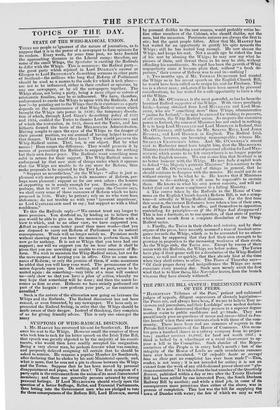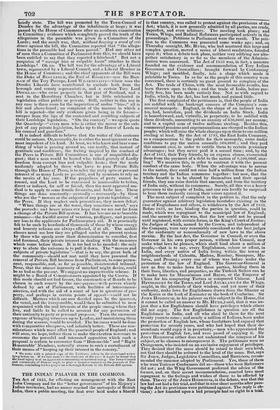TIIE PRIVATE BILL SYSTEM : PREEMINENT PURITY OF THE PEERS.
" HEREDITARY Tribunes of the Poor," patient and unbiassed judges of appeals, diligent supervisors of slovenly legislation— the Peers are, and always have been, if we are to believe Tory re- viewers and journalists, and their Lordships' own modest declara- tions. It is now discovered that they possess in a superior degree another claim to public confidence and gsstitude. They are punctiliously pure on questions of meum and tuum—blind as Jus- tice herself when their own interests clash with those of the com- munity. There have been and are rumours of roguery in the Private Bill Committees of the House of Commons. One mem- ber gets a hundred shares in a railway company from its projec- tors ; another receives Iti,000/. for land not worth 2001.; a - third is bribed by a wharfinger or a canal share-owner to op- pose a bill in the Committee. Such slander of the Repre- sentatives of the People is in every body's mouth : but of the integrity of the House of Lords no such scandalous rumours have ever been circulated. " Of culpable haste or corrupt bias on their part no complaint has ever been made !"—This, reader, is not irony ; it is not intended for satire; it is not an extract from the work of any old-fashioned proses about our " glo- rious constitution." It is taken from the last number of the Quarterly Review, published within a day or two after the Trinity Harbour Bill had been settled by one interested Peer, the South Durham Railway Bill by another; and while a third job, in some of its consequences more pernicious than either of the above, was in process of completion. This last was the bill for supplying the town of Dundee with water; the fate of which we may as well legislation either public or private. Still, neither in this nor in The first complaint of the petitioners is, that the people of India any case is there room for the imputation of undue "bias;" all is are saddled with the bankrupt concern of the Company's corn- fair and above-board ; no complaint of the manner in which a mercial monopoly. England, in the shape of an indirect tax on bill is rejected—the only evidence given being in its favour— tea, had, heretofore, paid the dividends on India Stock. India escapes from the lips of the contented and confiding subjects of is henceforward, and, virtually, in perpetuity, to be saddled with their Lordships' legislation. " On the contrary"—we again quote these dividends, amounting to an annuity of 630,0001. per annum; the Quarterly—" every man who is either the mover or the sub- and to a capital sum of twelve millions sterling. Besides this, ject of any private legislation, looks up to the House of Lords as commercial pensions and superannuations are charged to the Indian
his counsel and guardian." people; which will raise the whole charges upon them to one million
It is indeed difficult to believe that the writer of this sentence sterling at least. By the Act of 1793, the East India Company, could be series's. Or,assuredly,he is either the most ignorant or the as a compensation to the public for their monopoly, came under most impudent of his kind. At least, we whoknow and hear some- conditions to pay the nation annually 500,0001.; and they paid thing of what is passing around us, can testify, that instead of this amount once, in order to entitle them to certain pecuniary gratitude and confidence, the feeling inspired by the conduct of advantages ; but they never paid it a second time; and, by the the Peers in Private Bill Committees is one of unqualified dis- Act of 1813, their Tory friends, by an express clause, exonerated gust ; that a man would be hooted who talked gravely of Lordly them from the payment of a debt to the nation of 9,500,0001. ster- freedom from corrupt bias and culpable haste; that the mode ling! We mention this, in order to contrast it with the present uniformly adopted by those who have to pass Private Bills conduct of the same body. When the advantage was to accrue through the House of Peers, is to inlist the party spite or personal to the nation, they could not raise half a million from the Indian interest of as many Lords as possible, and by no means to rely on territory and the Indian commerce together : but now, that the the merits of his case. If the prejudices of party cannot be whole benefit is to be shared by themselves and their special roused, and the Lord to be canvassed is inaccessible to bribes, friends, they can raise double that amount, and from the territory direct or indirect, for self or friend, then the most approved me- of India only, without its commerce. Surely, all this was a heavy thod is to apply to some female favourite, and bribe her. These grievance to the people of India, and one can hardly be surprised things are done constantly—avowedly—necessarily—by those to hear them instantly raising their voices against it.
who are the " movers or the subjects of any private legislation" of The next subject of complaint in the petition is, that the only the Peers. If they neglect such precautions, they insure defeat. guarantee against arbitrary legislation heretofore existing in the
" When things are at the worst, they sometimes mend," says case of Englishmen and others, is withdrawn by the Act of 1833. the proverb : awl hence arises our hope that we are not far from Before 1833, no law, binding the parties in question, could he a change of the Private Bill system. It has become an unbearable made, which was repugnant to the municipal law of England; nuisance—the fruitful source of vexation, profligacy, and pecuni- and the security for this was, that the law could not be passed ary loss to the applicants for Parliamentary aid. It is practically until registered, with certain forms, in the King's Court of Justice; felt to be such by hundreds of thousands of those by whose energy the Judges of which, named by the Crown, and independent of and honesty reforms are always effected, if at all. The middle the Company, were very reasonably considered as the best judges classes must see how they are pillaged under the present system of the conformity or nonconformity of new laws to the above by those who openly avow their determination to consider, first maxim. By the last Act, the Governor in Council, or even the and foremost, their private interest in dealing with the measures Governor in his own proper person, without his Council, may which come before them. It is too bad to be mended : the only snake what laws he pleases, which shall bind about a million of way to abate the nuisance is to pull it down. The " movers and people,—that is to say, every Englishman, ashore or afloat, in subjects of private legislation "—that is to say, the great bulk of India, and every native of India living within the towns or the community—should not rest until they have procured the neighbourhoods of Calcutta, Madras, Bombay, Sincapore, Ma- removal of Private Bill business from Parliament, to some perma- lacca, and Penang; every one of whom was before under the nest, responsible, and, as far as possible, disinterested tribunal. protection of the law of England. The Governor-General is None, that the utmost ingenuity of mischief might devise, could now as free to make laws for these parties, binding them in be so bad as the present. We suggest no impracticable scheme. It their lives, liberties, and properties, as the Turkish Sultan can be might be a Board of Commissioners appointed by the Crown. If to make laws for Mussulmans and Rayas, or the Emperor of this mode should not find favour, the construction of Boards to be China for his conquering Tartars or conquered Chinese. Lord chosen in each county by the rate-payers—with powers clearly HEYTESBURY for the Tories, and Lord AUCKLAND for the Whigs, defined by act of Parliament, with facilities of intereommu- might, in the plenitude of their wisdom, and yet more of their nication, and with the aid of a court of law in questions of pro- authority, make laws for Englishmen drawn from the Shaster or perty, and perhaps in certain points of appeal—w ould not be the Koran or the book of Zoroaster or the book of Confucius. Sir difficult. Matters which are now decided upon by the ignorant, JOHN HOEHOUSE, in his palaver on this subject in the House, (for the venal, and the irresponsible, would then be submitted to men it cannot be called an answer to Mr. HUME,) said, that it was un- acquainted with the real interests of the people among whom they just that a few Englishmen should have privileges which others live, and liable to be called to account for any perversion of did not enjoy. The few Englishmen in question are all the their authority to party or personal purposes. Then the enormous Englishmen in India, and all who shall be there for the next expense of bringing witnesses up to London, and maintaining them twenty years to come ; and nearly a million of Indians, born under during the session, would be avoided. The business would be done the protection of English law, whose forefathers had enjoyed that with comparative cheapness, and infinitely better. These are cop- protection for seventy years, and who had hoped that their de- siderations which must affect the practical people of England; and scendants would enjoy it in perpetuity,—men who appreciated the will soon, we hope, induce them to make the exertion necessary to protection of English law, and were proud of enjoying it. Sir overcome the powerful and interested opposition which such a JOHN HoeImun either does not understand the compass of his proposal is certain to encounter from " Honourable" and " Right subject, or he chooses to misrepresent it. The petitioners were no Honourable" Members, naturally averse to such a curtailment of Orangemen, who insisted on an exclusive enjoyment of privileges.
their means of" keeping up their interest in the country." They desired that the mass should be raised to their own level,
• we write with a printed copy of the Et idence. taken by the short-band writer not that they should be reduced to the level of the mass. But, says lying before us. If we hail room 1,,r the statistics of the e:ii .. it would be Poirot that Sir JOHN, Judges, Legislative Councillors, and Barristers, recom- tee local injury is of au aggravation amounting to national wrong. The Town-Cuncil and community of Dunileo ought to place a !Urinal crawl:tint on the jonrnals or l'ar- mended the measure adopted by Parliament. Yes, those of them Hameln, concluding with a prayer i,r a thorough Reform of the Private Bill system. who were Tories or Conformers did so—those who were Reformers



























 Previous page
Previous page